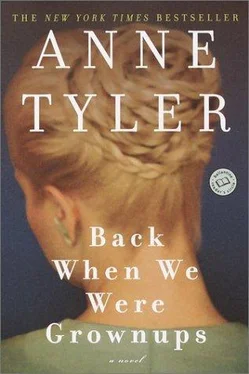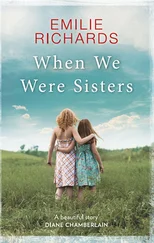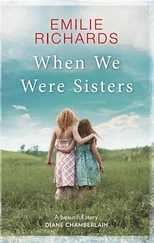They didn’t seem all that thrilled. They had the bleary, befuddled look of sleepers awakened too suddenly, and they followed her back down to the kitchen in a shuffling silence. When she set out toast and jam, Lateesha’s eyes filled with tears. “The jam’s got dots!” she said. “It’s got dots that will stick in my teeth!”
“Those are raspberry seeds, dummy,” Joey said.
“Joey called me a dummy!”
“Now, now,” Rebecca said. “Never mind; I’ll find you some nice grape jelly.”
Then Poppy came down wanting his breakfast, and he needed the situation explained to him several times. “Min Foo’s having a baby? I thought she was divorced,” he said.
“She was, Poppy, but then she married Hakim, remember?”
“Hakim! Good glory, not another black man!”
“No, Poppy, he’s Arab. What a way to talk,” Rebecca said, sending a glance toward Lateesha. But Lateesha was absorbed in spreading grape jelly precisely to the edges of her toast, and she seemed oblivious.
After breakfast, Rebecca made up the two beds in the guest room and propped Lateesha’s pink pillow against one headboard. This had probably once been a servant’s room. It was small and stuffy, with an oppressively low ceiling and a single narrow window. In one corner stood a dark wooden bookcase crammed with curling paperbacks, faded textbooks from the girls’ school days, and the histories and biographies that Rebecca used to read in college. She used to get crushes, almost, on people like Mahatma Gandhi and Abraham Lincoln. She would study them in depth, try to learn every detail of their lives in much the same way that her roommate studied the lives of movie stars.
And she had once been so political! She had picketed the Macadam cafeteria on behalf of its underpaid workers; she had marched against the war in Vietnam; she had plastered the door of her dorm room with anti-nuclear stickers. Now she could barely bring herself to vote. All she read in the newspaper was Ann Landers and her horoscope. Her eyes slid over Kosovo and Rwanda and hurried on.
It occurred to her that so far, the only step she’d taken toward retrieving that old Rebecca was to try and reconnect with the old Rebecca’s boyfriend. Like some fluff-headed girl from the fifties, she had assumed she would reach her goal by riding a man’s coattails.
Just as well that she had failed, she told herself. (Although still, more than two weeks later, the memory of her dinner with Will continued to pinch her pride.)
The telephone rang and she flew downstairs, calling, “Get that, somebody! Answer the phone!” because she thought it might be Hakim. But it was only the man from Second Eden, arranging to come replace the dead azaleas in the backyard. “Now, I don’t want to do it quite yet,” he said, “because it’s still kind of warm. Could turn downright hot again, even, and I always advise waiting till—”
“My daughter’s having a baby; could you get off the line?” she said.
“Oh! Sorry.”
“Not that I mean to be rude,” she said, instantly feeling guilty. “It’s just, you know how it is when one of your children—”
“Ma’am. Believe me. My daughter had twins. Me and my wife sat in that waiting room twenty-one hours.”
“Twenty-one hours!”
“The nurses kept saying, ‘You-all might want to go home and come back,’ but we said, ‘No, sir. No, indeed. No way, José. Not on your life,’ we said, and it got to be suppertime, got to be dark, got to be the next morning—”
“I have to get off the line,” Rebecca told him. She hung up, and then felt guilty all over again.
It seemed she always developed a stomachache when one of the girls was in labor. Unconsciously, she would spend the duration holding in her abdominal muscles. It made her wonder how the nurses in delivery rooms survived.
As luck would have it, no party had been scheduled for that evening. The Open Arms was going through a slow spell. But to keep the children amused, she hauled out all the candleholders and set them on the dining-room table. Then she unloaded a mammoth shopping bag of fresh candles. “Put in any color you like,” she said. “After that you can light them for a minute, just so they’ll lose that new look. Only while I’m in the room, though; you understand?”
She watched Joey choose a taper striped red and white like a barber pole — a bit Christmassy, but never mind. She said, “Now that fall’s on the way, we can start using candles at parties again. I always hate to give them up over the summer, but it’s true they have a sort of warming effect psychologically, even if they don’t produce that much actual heat.”
The telephone in the kitchen bleeped once and fell silent. Rebecca paused for several seconds, but no rings followed.
“When I was a little girl,” she went on, “my Aunt Ida gave me this beautiful, tall white candle with a kind of frill of white lace running up it in a spiral. I thought it was the most elegant thing I’d ever seen in my life. I saved it in my bureau drawer for some momentous event, although I can’t imagine now what that would have been. I mean, I was only eight years old. Not a whole lot of momentous events happen when you’re eight. And Aunt Ida would ask me, now and then, ‘Have you ever burned that candle?’ I’d say, ‘No, not yet. I’m saving it,’ I’d say. Then one day, oh, maybe three or four years later, I came across it in my drawer. It had turned all yellow and warped; it was practically a C shape, and the lace was coming off in crumbles. I’d never seen it burning, and now I never would. So ever since that time, I light my candles any chance I get. I light them by the dozens, all over every room, at every party from September through May. Multitudes of candles.”
She handed each child a box of matches, and they started lighting the candles that marched the length of the table — tapers and pillars and votive lights, white and colored and striped and gilded, blazing in the dim room like a skyful of stars.
* * *
It was after one o’clock when Hakim finally called. “I have a son!” he said. “He is huge: eight pounds ten ounces. Is looking just like me. Min Foo is feeling fine and sending all her love.”
“What’s his name?” Rebecca asked.
“We have no name. NoNo said that it would only be a girl.”
“Oh. Right,” Rebecca said.
She let the children telephone their aunts and all their friends to spread the news, and after that she hauled out her decorating supplies and the three of them made a poster reading WELCOME HOME, MOM AND LITTLE BROTHER . Then Poppy came down from his nap and they all drank a ginger-ale toast in Mother Davitch’s sherbet glasses. Poppy seemed to have the impression that the baby was Rebecca’s, but he got that straightened out in due course.
When Hakim called again, in the late afternoon, Rebecca drove the children to the hospital for a visit. “You two are lucky,” she told them on the way. “It used to be they wouldn’t let children visit before they were twelve. Your aunts didn’t see your mother till I brought her home from the hospital.”
Hard to believe that had been thirty-two years ago. To Rebecca, it seemed as vivid as last week: the nearly imperceptible weight of that tiny body, the warmth of that downy head nestling in the crook of her neck as she climbed the front steps, and the three little girls in the doorway, goggle-eyed and awed, reaching out reverently to touch the baby’s foot.
When she was handed her new grandson in the hospital room — another modern development, no plate-glass window between them — she had a moment of confusion where it seemed he was Min Foo. He had Min Foo’s paintbrush hair and caraway-seed eyes, and he peered curiously up at Rebecca as if he thought he might know her from somewhere. “Look,” she told the children. “He’s saying, ‘Who are you? What kind of people have I ended up with, here? How am I going to like living on this planet?’”
Читать дальше












